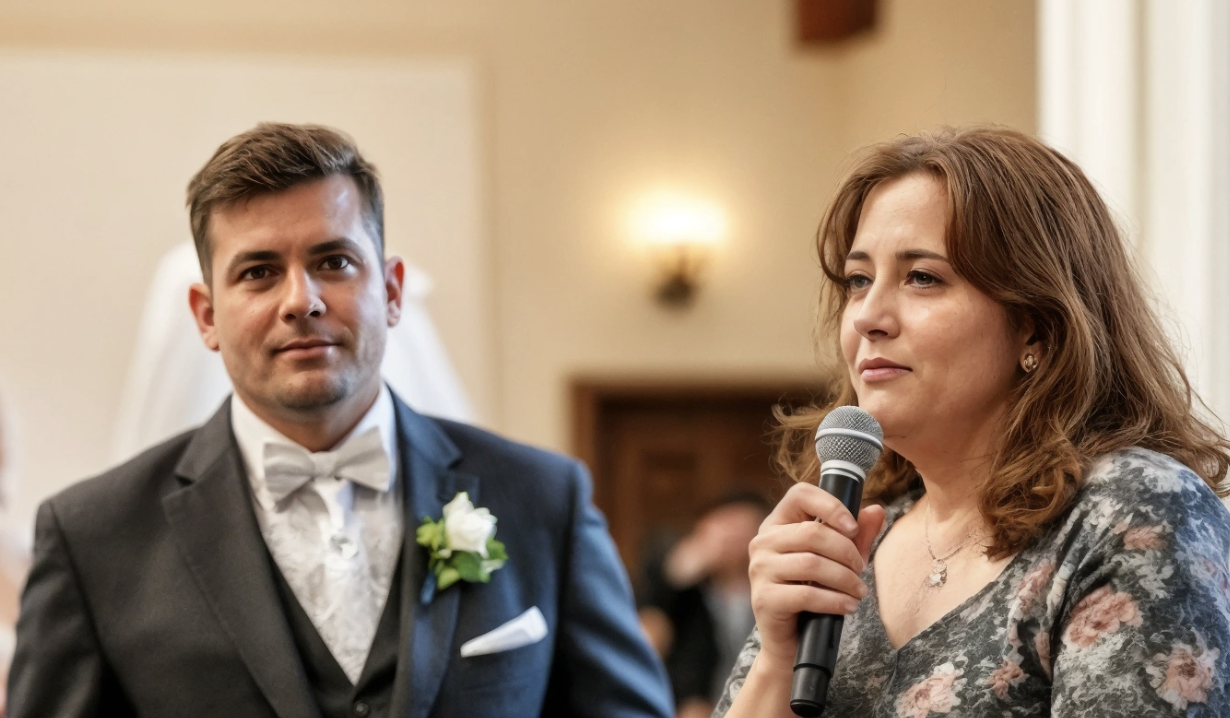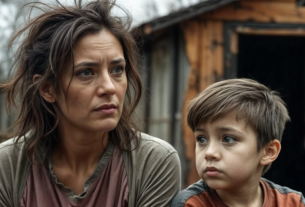For Nina Petrovna, her son’s wedding was supposed to be one of the brightest days of her life. But just hours before the celebration began, she heard words that seemed to tear everything apart inside her:
— Who is she anyway? A homeless woman… The mother of my bride… What a disgrace.
These words were spoken by her future son-in-law — loudly, without any shame, in front of some of the guests. Without a shred of respect.
Nina stood in the corner of the banquet hall, wearing an old but neat coat, and on her head — a white little hat that she didn’t take off even in summer. Her hair hadn’t grown back after chemotherapy. She looked fragile but not broken. Although life had dealt her a lot of pain: once she was a literature teacher, then a wife, a mother… and then she was left alone — with illness, loneliness, and a tiny pension barely enough to get by.
But she didn’t complain. Because the main thing — her daughter was happy. Today, she stood in a white dress, shining with joy.
And those words… “homeless woman”…
Like a blow. Harsh, merciless.
She remained silent. Until that very moment when the bride’s friend handed her the microphone and her daughter, smiling warmly, said:
— Mom, say something.
And Nina spoke. Quietly, but confidently.
— I am not rich. Neither by birth nor by fate. I had only one treasure — my girl. I couldn’t buy her fashionable dresses, but I was always there when she was scared. I couldn’t pay for studying abroad, but I sat by her room at night when she was hurting — either in body or soul.
The hall fell silent. Even the music stopped.
— Today I heard someone call me a homeless woman. You know, it doesn’t hurt. Because I know who I am. I am a mother. A woman who has been through a lot to raise a person. I raised the one who today stands in a wedding dress. The one who glows with kindness. And if all I have is an old hat, gray hair, and a bit of truth — then I have the most important thing. That which many do not have.
She paused. Tension hung in the room. Then someone was the first to applaud. Then the applause grew into a wave through the hall. Tears ran down the cheeks of the guests. The toastmaster looked away, hiding the shine in his eyes. And the son-in-law — that very man — slowly lowered his head.
He came up to her. For the first time all evening. Carefully took her hand.
— Forgive me… Mom.
And at that moment it became clear: sometimes one honest word is enough to change everything. Even if the heart is long tired and lonely.
Nina felt his palm — warm, a little trembling. He didn’t apologize with words. He just didn’t let go of her hand. Not out of pity. Out of love. For his wife, for the family, for the woman who became like a mother to him.
— Thank you, son, — she whispered, and those two simple words became the beginning of a new path. From bitterness — to reconciliation. From loneliness — to acceptance.
Then there were dances, laughter, hugs. But now — Nina no longer stood aside. She was invited to the center of attention. To the main table. In front of her they placed a cake — small but special, with the inscription: “To the most beloved mother.”
And a week later he came to her himself. Without unnecessary words. He brought a bag from the pharmacy.
— This is what you didn’t buy for yourself before, because you saved money for her. Now — take it. For yourself.
He spoke little. But did more than words could say.
Since then, they began to meet more often. Sometimes together, sometimes separately. The daughter called every day, told news, asked for recipes. And one day he brought a wooden box — handmade by himself.
— This is for your letters. You are a literature teacher, after all. Surely you write beautifully. Tell us about your life.
Nina looked at the box for a long time. Then she sat down and wrote a letter. Not to him. To herself — young, lost, forgotten.
“Dear Nina,
You have not lived all these years in vain. Every moan, every tear, every lonely night — it was not for nothing. Because one day even the heaviest pain will learn to speak with kindness. And those who turned away will come back. If you keep your heart open.”
That’s exactly how it remained — open. A mother’s heart.
And every week she added a new letter to the box. Sometimes — lines of poetry. Sometimes — lines from memories. And sometimes — just one sentence:
“Today I woke up and did not feel lonely.”
No one called her “homeless woman” anymore. Now they called her Mom. Grandma. Family.
Once her grandson, pressing close to her, asked:
— Grandma, are you a real magician? You have such kind eyes… Is it because of the hat?
Nina laughed and nodded:
— Yes, my dear. Because of the hat. And a little — because of the love that knows how to wait.
Because in that hat everything was contained: her life, her pain, her hope. Her heart.
Spring came earlier than usual. The sun looked in the window not like a rare guest, but like an old friend. Nina Petrovna sat by the windowsill, knitting little blue socks. Children’s footsteps echoed again in the house.
Her daughter recently said:
— Mom, we’re going to be parents.
And softly added:
— I always dreamed he would know you.
That night Nina did not sleep. She lay, pressing her palms to her chest, as if keeping warmth there. Not pain. Not fears. But something bright. Something alive. Hope.
A few weeks later the son-in-law came for her. Without explanations. Just said:
— Mom, now you are with us. We want to be a family. Whole.
And quietly added:
— I need this too. Very much.
She got a room with a view of the garden. Small but cozy — with a soft armchair, curtains on the window, and a bookshelf. And, to her surprise, on the wall hung the wooden letter box. The very one her son-in-law had made once.
One evening he gently knocked on the door:
— Mom… may I come in?
He entered, lowering his gaze:
— I read all your letters. Sorry, I couldn’t resist. But now I understand you. Your pain. Your strength. I’m afraid our son will grow up not knowing how much he is loved… just as I myself didn’t understand before.
Nina came closer and hugged him. Without words. Like a son. Like a person who came home.
When the boy was born, he was the first to smile at her — his grandmother. At the very moment when she was singing him a lullaby, the same one she once sang to her daughter in a cold apartment, under the flickering light of a street lamp.
She sang, and in her voice was everything: loneliness, forgiveness, love. The baby fell asleep in her arms, and the son-in-law bent close and whispered:
— You are our root. Our light.
Nina just smiled. And thought:
“Maybe I was a homeless woman — only without a home. But now I have one. Not walls, not a roof, but people. Their voices, their warmth, their trust. And that is worth more than all the riches in the world.”
That evening she wrote the last letter. The shortest:
“I am happy. Finally. And forever.”
Years passed.
The grandson was already in school. He had friends, favorite lessons, dreams of his own. But most of all he loved the evenings when Grandma Nina sat in the armchair, wrapped in an old blanket, and began to tell stories — sometimes true, sometimes fairy tales, sometimes just between the lines.
And always — in her white hat. He was sure: that’s where the magic was hiding.
— Grandma, will you always be here? — he asked once, hugging her shoulders.
— As long as you remember me, I will always be near.
In the spring, Nina could no longer get up. It just became difficult. Her daughter held her hand, and the son-in-law stood at the doorway, not daring to come closer. But now he did not hide. He said:
— My light… wait for me.
And read her letters aloud — the very ones kept in the box. Once he said:
— You wrote: “A tired heart can become a home.” For us, you became that home.
And when the day came, she left easily. Calmly. Like the first time, with a child on her chest. Her last words to her daughter were:
— Thank you for never being ashamed of me. Never…
At the farewell gathering, the whole hall gathered. Former students. Neighbors. People who heard her story for the first time. The son-in-law held the white hat in his hands. For a long time. Almost tenderly. Then carefully laid it next to the letters.
— This was not just a hat, — he said. — It was her shield. Her light.
And the grandson, standing nearby, sniffled:
— I will grow up and become like Grandma. Only a boy.
The daughter hugged them both. Just like she once was hugged. Tight. With love.
In the evening they opened the box. At the very bottom lay a letter, written in uncertain handwriting:
“If you are reading these lines — it means I am already among the stars. But know: I am with you. In you. In every kind word. In every gesture. If someone says you are nothing, remember: you grew from love. And that means you are everything.”
And that evening everyone cried. Not from grief. But from light. From love. From the fact that even after death, kindness continues to live.
And will live. Forever.



